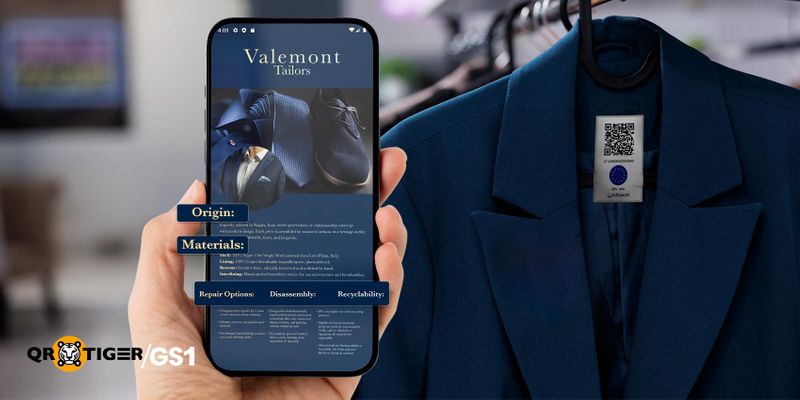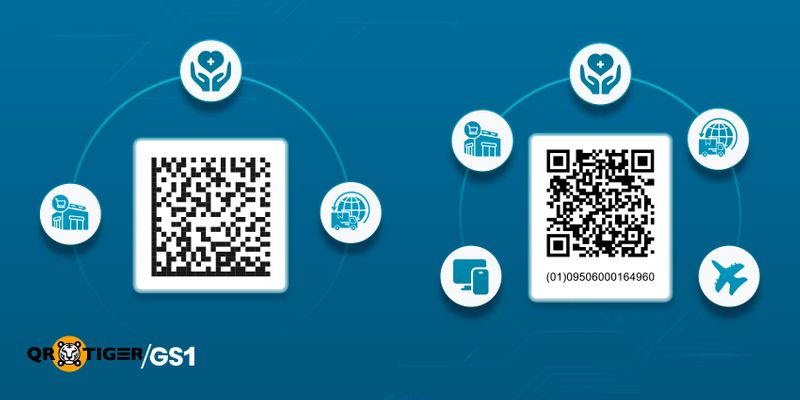GS1 France: Improving Supply Chains With Better Traceability

Efficient product recognition and effective data sharing are vital for businesses to operate smoothly. GS1 standards in France play a key role in optimizing supply chains by ensuring accurate tracking, enhancing transparency, and fostering trust across the supply chain industry.
The GS1 solutions empower industries to improve traceability and optimize operations. This article will explore how they transform supply chains with their cutting-edge traceability solutions.
Table of Contents
What is GS1 France?
GS1 France (FR) is a member organization (MO), of the GS1 international organization, neutral and non-profit, created by companies to facilitate and automate exchanges between partners based on a unique identification system.
The local chapter oversees the development and maintenance of global standards for business communication. These standards are a common language that facilitates and secures information sharing between all partners and customers globally.
With the GS1 standards, French companies can uniquely identify their products and logistics units, locations, entities, and equipment throughout their lifecycle. Businesses can adopt these standards to streamline operations, reduce errors, and build customer trust.
Address: 21, Boulevard Haussmann, 75009, Paris, France
Contact no: +33 1 40 22 17 00 / +33 1 40 22 18 00 (Customer service)
Email: serviceclient@gs1fr.org
Collaborated Campaign
Carrefour & GS1: Enhancing Product Data Management
Carrefour, one of the largest retail chains, collaborated with GS1 to improve data synchronization and simplify communication with its suppliers.The need for this collaboration arose from inefficiencies in product data management, where Carrefour had to exchange multiple back-and-forth communications with suppliers to finalize product details.
By implementing the GS1 Global Data Synchronization Network (GS1 GDSN), Carrefour aimed to simplify data exchanges, decrease errors, and enhance operational efficiency. The integration allowed product information to be standardized and shared across the supply chain, ensuring consistency and accuracy.
Equadis & GS1 FR: Improving Product Data Quality
GS1 FR’s and Equadis have collaborated to improve product data quality between suppliers and distributors. They introduced the ‘Data Quality Checker’ to ensure compliance with GS1’s validation standards, helping businesses maintain reliable and accurate product information.This tool automates data verification across sectors like food, beverages, hygiene, and drugstores, decreasing inconsistencies in product details. This move also cuts down the need for manual reviews.
Equadis built this solution specifically for GS1 FR’s quality program. Operators must now undergo regular assessments to either maintain or earn qualification, helping maintain data integrity across France’s retail supply chain.
GS1 FR Ensures Compliance with EU Medicine Regulations
The EU Falsified Medicine Directive (EU FMD) is a regulation designed to avoid counterfeit medicines from entering the European supply chain. It requires unique product identification, verification systems, and secure packaging features to safeguard patient safety.GS1 FR, in collaboration with the Club Inter Pharmaceutique (CIP) and the French National Agency for the Safety of Medicines and Health Products (ANSM), plays a key role in its implementation.
To ensure continuity in medicine coding, GS1 FR helped establish a tripartite agreement that preserves the CIP and UCD codes within French regulations. These codes are officially recognized by the French Ministry of Health and comply with ISO/IEC 15459-3 and ISO/IEC 15459-4 standards, ensuring consistency with global identification systems.
By supporting this system, GS1 FR ensures that medicinal product identification remains consistent and compliant with EU and national regulations. This collaboration enhances traceability, strengthens supply chain security, and secures the availability of medicines for patients in France.
Circular Initiatives by GS1 Standards in France
These standards make the transition to the circular economy through initiatives like:
1. Impack’t
2. Digital Passport Product
Let’s get into the details of each of these initiatives.
Impack't
The GS1 FR launched the Impack't initiative in November 2023 to reduce the impact of packaging on the environment. The initiative involves individuals and organizations working collectively to find common solutions to effectively implement the national 3R strategy (reduction, reuse, recycling).Impack't is 6 areas of work as explained below.
Packaging data: In 2020, the French GS1 Chapter, in partnership with Citeo, launched a community dedicated to digitizing packaging information. This group, comprising hundreds of companies and stakeholders, developed recommendations to enhance the GS1 product sheet.
On February 25, 2023, the GS1 product sheet was updated to incorporate these recommendations. The new version allows detailed packaging information, including type (capsule, lid, etc.), materials used, quantities, recyclability, reuse potential, and recycled material rates.
Reusable packaging: Reuse traceability enables professionals to track reusable packaging throughout its circular life cycle with varying precision. Growing consumer expectations, regulations, and business innovation are driving its development.
Effective traceability is essential to shaping a national reuse model, ensuring convenience for consumers while enhancing environmental and economic efficiency.
GS1 SMART-Box: The GS1 SMART-Box is a reusable modular container developed through European collaboration to improve the efficiency of logistic operations.
The French chapter adopted the GS1 Germany initiative. The initiative optimizes packaging, reduces waste, and supports the transition from disposable plastic to recyclable materials.
Designed for automation, it lowers load break costs and enables logistics pooling. Each SMART-Box has a unique GRAI code (RFID and barcode readable) for traceability and security.
GRAI stands for Global Returnable Asset Identifier. It is a GS1 Key that is used for the management of reusable transport items, transport equipment, and tools. It can identify these returnable assets by type and if needed also individually for tracking and sorting purposes.
Available in two sizes, GS1 SMART-Box lasts 10 years and can be reused at least 100 times, with an assessment tool to measure its impact on users.
Smart Sorting: It focuses on the interoperability of invisible tracers on disposable packaging to improve industrial sorting and boost recycling efficiency.
It uses Digital watermarks, i.e., imperceptible markers on packaging to enable precise sorting by providing detailed composition data through a unique identifier. These advanced technologies ensure high-performance waste management.
Bulk: GS1 in France collaborates with En Avant Vrac, ILEC, the National Pact for Plastic Packaging, and Perifem to develop harmonized solutions for the bulk sector. The objective is to optimize in-store operations and enhance the customer experience.
Key initiatives are:
- Standardized containment identification for efficient product recognition.
- End-to-end traceability system to improve supply chain transparency.
- Consumer information access, including expiry dates and marketing details.
These initiatives ensure better management, reduced friction, and greater trust in bulk shopping.
The digital deposit system: GS1 FR supports the development of a digital deposit system, offering a modern alternative to traditional systems. These solutions rely on serialization, assigning a unique serial number to returnable products.
Consumers can easily reclaim their deposit by scanning a unique code on the container via a smartphone app, improving convenience and engagement in recycling efforts.
Digital Product Passport

The Digital Product Passport (DPP) is a dynamic digital record that provides key details about a product’s origin, composition, repair options, disassembly methods, and recyclability. It is an EU initiative, and GS1 provides solutions to help manufacturers comply with this regulation.
It enhances data sharing across the value chain—benefiting producers, importers, distributors, repairers, recyclers, and consumers.
Mandatory under the ESPR (Ecodesign for Sustainable Products Regulation) and other EU laws like the Construction (CPR) and Battery (EV) Regulations, the DPP applies to specific physical product categories , and components sold in the EU.
While the European Commission is still finalizing the product categories, the initial analysis highlights batteries, textiles, electronics, and construction. The food, feed, and medical products are not currently prioritized.
Transition from linear to the circular economy
The circular economy is a model of production and consumption, which involves sharing, leasing, reusing, repairing, refurbishing, and recycling existing materials and products as long as possible. In this way, the life cycle of products is extended.GS1 FR is committed to 3 major projects in the coming years to facilitate the transition. These projects are explained below.
For a more responsible diet and enhanced supply chain transparency
The GS1 augmented QR Code allows consumers and businesses to access detailed product data with a simple scan. It supports consulting applications, helps track environmental impacts, and provides expiry dates to reduce in-store losses.Unlike the EAN-13, which only encodes the GTIN, this GS1 2D barcode includes batch numbers, use-by dates, and a digital identity card for each product. By 2027, it will replace EAN-13 at checkout, unlocking new digital capabilities for brands.
Encapsulating a GS1 Digital Link, this QR Code adapts based on the user, scanner, and context, offering offline and online access to relevant data. Its information is updatable without reprinting, ensuring optimized traceability, compliance, and operational performance.
To reduce the impact of packaging
With the transition to reusable packaging, bulk, and deposit systems, the GS1 in France helps in reducing waste volume significantly.The introduction of new markers on packaging, the local chapter helps increase the efficiency of sorting centers and significantly improve the ability to recycle.
To enhance product lifecycle
The rise of the GS1 augmented QR Code will let professionals access the product data useful for extending its lifespan (maintenance, repair) as well as for better valuing its end-of-life (dismantling, component recovery, recycling).
The shift from traditional 1D barcodes (like UPC/EAN) to 2D barcodes (like GS1 Data Matrix and GS1 QR code) is taking place in multiple countries, including Canada, Japan, Germany, etc., and across industries.
However, upgrading isn’t automatic, companies need to prepare their systems, ensure compatibility, and educate stakeholders on the benefits.
Sunrise 2027 is a global initiative that encourages retailers to integrate 2D barcodes into their point-of-sale systems by 2027. It is a guideline, not a hard deadline, but businesses that begin adapting now will avoid last-minute disruptions.
Applications of 2D barcodes across industries in France

Retail & Ecommerce
French retailers are adopting GS1 DataMatrix and QR codes for detailed product data, including batch numbers, expiry dates, and sourcing transparency. GS1 retail barcodes facilitate efficient communication in product tracking.The GS1 local chapter is working with retailers to ensure point-of-sale (POS) systems can scan and process 2D barcodes by 2027.
Healthcare
French healthcare providers use GS1 standards to track medical equipment and prescriptions efficiently. These standards help improve patient safety and reduce errors.The French GS1 chapter ensures compliance with EU regulations by implementing GS1 DataMatrix barcodes for drug verification.
Transport & Logistics
Logistics firms use GS1-compliant barcodes to track shipments to ensure accurate deliveries. By scanning the GS1 QR code for inventory and supply chain logistics found in manuals and guides, consumers can access detailed information, transforming how they interact with products and enhancing the success of supply chain operations.Technical Industries
Companies in the electronics and automotive industry use GS1 standards to identify small components, avoid counterfeiting, and improve inventory management.In the aerospace & defense industry, stakeholders use the GS1 Digital Link QR code to enhance traceability in supply chains, ensuring compliance with industry regulations and safety standards.
Inspiring success stories from GS1 France
GS1 France has helped businesses across different industries improve efficiency, transparency, and product traceability. These success stories highlight how companies have benefited from GS1 standards and innovative solutions to streamline operations and enhance customer trust.Creapharm
Creapharm is a contract packaging and logistics organization. Previously, stakeholders relied on proprietary systems, leading to inefficiencies in tracking investigational medicinal products.To undergo standardized identification of investigational health products, Creapharm has adopted GS1 standards. By integrating GS1 DataMatrix barcodes, Creapharm standardized its product identification, ensuring accurate tracking from manufacturing to distribution.
The company updated its internal control system to align with GS1 Global Trade Item Numbers (GTINs) and batch-level serialization. Thus, it improved data accuracy and interoperability across the supply chain.
Adopting GS1 standards helped the company improve patient safety and optimize logistics for investigational drugs.
Arrivé
Arrivé is one of the poultry leaders in the French market. It faced challenges in ensuring full traceability across its complex poultry production chain while complying with strict food safety regulations.It used the GS1 Global Traceability Standard (GTS) to ensure end-to-end traceability by standardizing data collection and exchange across different stakeholders (like farmers, processors, and retailers). Arrivé used Global Trade Item Numbers (GTINs) for product recognition and Global Location Numbers (GLNs) to track locations within the supply chain.
It implemented GS1-128 barcodes to encode batch numbers, expiration dates, and other critical product details to improve accuracy in tracking poultry products. By integrating these GS1 standards, Arrivé improved transparency, reduced errors, and ensured regulatory compliance.
Adopt GS1 France to Simplify Business Operations
GS1 standards in France enhance traceability, data accuracy, and supply chain efficiency, ensuring smooth interoperability across industries.By using GS1-complaint QR codes, businesses can benefit from optimized product identification, supply chain optimization, and improved customer trust. A business entity can join the GS1 Chapter in France to ensure smooth integration of QR codes, improve workflow, and maintain global compliance.
FAQs
What is GS1 FR, and what does it do?
GS1 in France is the local chapter of the global GS1 organization, which develops and maintains standards for barcode identification, supply chain management, and data synchronization. It helps businesses enhance efficiency, traceability, and interoperability across industries.
How does the GS1 local chapter contribute to sustainability and the circular economy?
The French GS1 chapter launched initiatives like Co-Next 2024 to focus on standardized data sharing, support sustainable business models, and reduce waste.
What industries benefit from following GS1 standards?
It supports industries such as retail, healthcare, transport & logistics, and technical industries by providing standardized identification and traceability solutions.
DISCLAIMER: We acknowledge that GS1, as well as the materials, proprietary items, and all related patents, copyright, trademark, and other intellectual property (collectively, “intellectual property”) relating to its use, are the property of GS1 Global, and that our use of the same shall be in accordance with the conditions provided by GS1 Global.




